Radio personalities versus radio programmers & radio consultants: in Facebook language, their relationship is ‘complicated’. How can they reinforce each other?
The first part of the session Don’t Kill The Radio Star at Lokalrundfunktage 2017 made clear that radio needs personalities to prosper, and that there’s enough new talent around – we ‘just’ have to make our medium interesting enough for them to consider a career in radio. But then there’s that love-hate relation between formats and freedom; programming and creative. Program directors (and their advisors) have to cope with personalities, and talents have to deal with them. “Consultants said to me: you’ll never become a morning show host.”
“We need those artists”
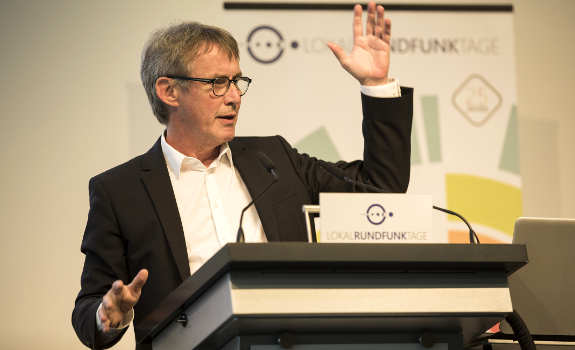
Talent coach Viktor Worms believes in facilitating personalities to create beauty (image: BLM)
Defend your personal beliefs
Hitradio Ö3 personality Robert Kratky was close to being fired a couple of times by his previous content director: “He threatened at least two or three times: when that-and-that happens again, I’m kicking you out”. The presenter thinks that radio personalities should overcome fear, and stand up for what they believe in, if a lot of personality is feasible for this particular station. “There are certainly formats that can handle it, but there are also formats where audiences primarily want to hear music.” His impression is that under their current director of programming, Georg Spatt, Ö3 doesn’t have many restrictions for talent. “Yes, the format should be followed, but when someone has a good idea and thinks: ‘I will now break the format’, then he may throw it out and answer for it later.”
Give your audience priority
In his opinion, that responsibility is not just towards the station management, as he feels like talent should focus on the listener instead. “The presenter who is concerned about his program director has already lost. The PD is there for those who need a missing link between them and the audience. Great personalities manage to overcome this hurdle, and talk to people instead. We’re not in the music business; not in the news business; certainly not in the we-copy-social-media business; we’re in the people business. We all like going to our favourite cafe where we know bar tender, who knows our name and is greeting us personally. It’s like getting home. You feel welcome, and you’re being cared for.”
Support your radio personalities
Kratky heard from listeners abroad that they once drove into the country on the way to their vacation adress, and discovered Ö3 on their car radio. They still like to hear Ö3 because, as they apparently said, it remembers them of their holiday in Austria. “That’s an emotion; a human factor within all those technical things that surround us, no matter which format we’re running. It’s about allowing human things.” He thinks that a program director can help doing that in a well-thought out manner. Talent coach Viktor Worms adds that while paintings made from colouring in numbered fields might be nice to see, they will never be a masterpiece. He therefore would rather offer talent a white canvas and beautiful colours. “It may go wrong, but it can also lead to art. We need those artists.”
“He had no idea who the person was”
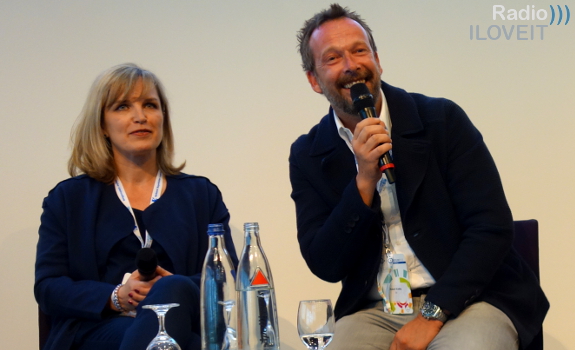
Robert Kratky recalls his first aircheck session with a renown talent coach (image: Thomas Giger)
Keep your airchecks private
Talking about the often kind of ‘hate-love’ relation between on-air personality and program director, Sina Peschke of radio SAW (who has fulfilled both roles during her career) has mixed feelings about daily airchecks, especially when they happen in front of the whole team, where everyone has something to say about everything. “Imposing, and completely overrated or even useless” are her words to describe that way of doing airchecks. Her preference is to have aircheck sessions in one-on-one meetings, which she considers to be tough enough already. “You have to cope with criticism after putting yourself out there naked for hours, giving it everything you’ve got. Then someone comes and says: that wasn’t good, and I didn’t like that.”
Add your expertise value
One of her former PDs had a pleasant way of showing his opinion about the morning show, which she co-hosted back then. “He walked across the studio window. When we were good, he put his thumb up; when not, he put it down — that was our aircheck. It was that one moment where we went: shit, he’s heard it. It gave us a lot of room to act freely.” She has nothing against airchecks if the other person can bring something useful to the table. “When I’ve screwed up a ramp talk, I can hear that myself, but when it’s about nuances about how I use my voice or how I breathe, that can be useful.” Her preference is to do those evaluations on a reasonable frequency, also to keep up morale. “Those daily airchecks used to beat me down. You’re cranky for the rest of the day, and then feeling blocked the next morning, thinking: ‘what are they going to say about it afterwards?’ — and you’re no longer feeling free.”
Fill your radio backpack
Robert Kratky recalls his very first aircheck, during which he cried. The meeting was with talent coach Mike Haas in the presence of his former program director, in the PD’s office. Haas listened to his show, and then said this:
“For those who don’t speak Mikenian: he told me that he’d listened to an hour of completely over-the-top produced, perfectly blended, tightly run format radio, with all negative aspects of it — a constant repetition of consistent slogans with different pitches; whispered, sung or scratched — but that he had no idea who the person was that served him all of this. That is the key point.” He believes that on-air personalities should definitely know every discipline of radio they’re dealing with inside and out, from production and editing to news and reporting, as these are essential skills, but that in the end, having personality matters much more than knowing techniques.
“It pushed him to keep his own genius alive”
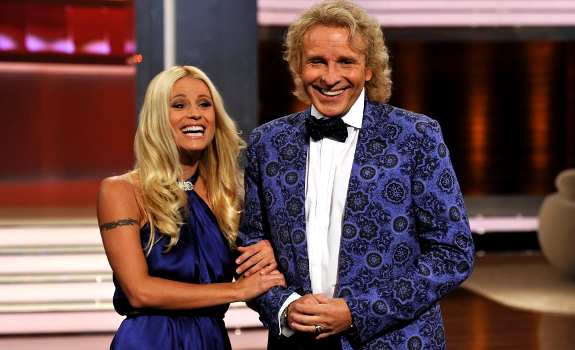
Thomas Gottschalk refused using pre-written jokes for his game show Wetten, dass..? (image: dpa)
Discover your talents elsewhere
“When I had the duty to find a great morning show host, I would either go and find someone outside radio who’s really talented, and who’s able to understand the technical part quickly. Someone who’s worked in hospitality for 10 years, like a great bar keeper, certainly has a lot of good skills. Or I would find someone within radio who’s not poisoned himself for the last 10 years, but always has been open to the questions: who am I, and what do I have to say to people? Can I invite them and take them with me; can I get closer to them without being too close?” He thinks that, no matter which format you’re in, you can develop a personality — when you have a boss who allows for it to happen.
Reinforce your brand strategy
“The unique selling point of radio, especially local radio, is the people”, Radio Leverkusen presenter Carmen Schmalfeldt says. “It’s not about the weather forecast or traffic updates, which I can get anytime and anywhere for my exact location. It’s about those real people that I can trust as a listener. To me, radio is a projection screen and life companion. I want to be there for people and talk with people, providing companionship and orientation.” What about casted morning shows, where each team member plays a certain role? Isn’t that the way anymore? “No, I don’t think so”, Victor Worms replies, adding that we obviously do have to choose presenters who fit the format in general. “I know great presenters who I’d never suggest to certain stations as they wouldn’t fit there, and wouldn’t be happy there either.”
Back your talents up
He thinks it’s important to provide your personalities with resources that they’re able to use as a backup when necessary (and that they’re allowed to drop as well). When he was working in television as head producer of the game show Wetten, dass..?, they used to give star presenter Thomas Gottschalk a few one-liners, written by excellent comedy authors, to go with every bit of the show. “He hardly used any of them, but it pushed him to keep his own genius alive during those 3.5 hours, as he was afraid that we would say afterwards: Thomas, instead of what you said there, this scripted one would have been better.” The fact that he basically never had to use his show prep makes Gottschalk unique. “Many people can tell jokes really well, but they’re not able to get the ideas for them.”
“Give people the idea that they are talking with you”
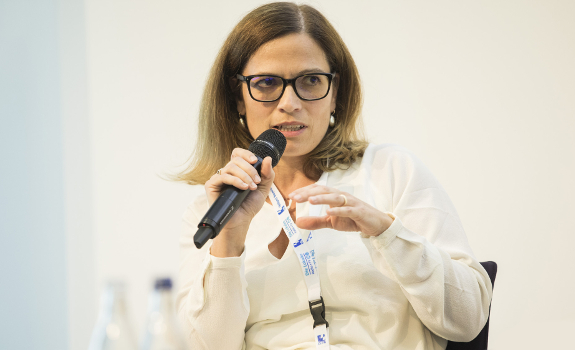
Carmen Schmalfeldt likes a presenter-audience connection, even if it’s one way (image: BLM)
Improve your call-in sound
What about using the listener’s input, like taking (live) phone calls? Robert Kratky does have listener interaction in his morning show on Hitradio Ö3, but usually not in the traditional way. “We have basically stopped doing call-ins, because the sound quality is sh*t”, he says in reference to cell phone reception. His advice: ask people to use WhatsApp or to call in through Skype or FaceTime. Apart from that, he feels like having callers on air is currently a bit out of fashion, also from the listener’s perspective.
“Especially younger target audiences are used to post something instead. People are less driven to elaborate about something on the radio; they’d rather like to be served.” He also questions whether putting winners on air makes that much sense nowadays. “We’re not fans of listening to someone else who’s having fun; we want to have fun ourselves.” He doesn’t believe that one-on-one conversations with listeners will entertain the masses, unless that person really has something meaningful to say. Otherwise, “it won’t make radio more interesting than Facebook or Instagram”.
Welcome your listener’s participation
Carmen Schmalfeldt adds that it may depend on the time of day. As a morning show presenter, she feels like her listeners have less need for interaction during these hours, as they’re engaged with getting their children prepared for school, or with getting themselves ready for work. “But I believe it’s meaningful when you manage to give people the idea that they could talk with you, or that they are talking with you. When you’re achieving a feeling of intimacy, even if it’s actually coming from one side only.” Victor Worms points out that extraordinary personalities are excellent storytellers. They take an ordinary story from everyday life, and tell it in a way that gets people’s attention and moves them emotionally, like putting a smile on their face.
Reflect your true mood
Talking about emotions: there seems to be a difference between German and Austrian radio. German radio presenters tend to always sound friendly, while Austrian radio personalities are usually less afraid to show the actual feeling, even if they have a bad day. “I have decided to be me”, Robert Kratky confirms. “Being cranky is one of our human colours.” He doesn’t feel like he’s a great presenter: “I can’t speak out one straight sentence; I’m not articulating well; I cough when I’m laughing; I snore while I’m breathing.” There was a time when he lost show after show. “Consultants came in and said to me: you’ll never become a morning show host.” He once thought about how he should proceed: working by the book, or by being himself. “I knew: when I won’t go out there as myself, I’ll have to play a role during all of my life.”
“Men can read the weather as well”
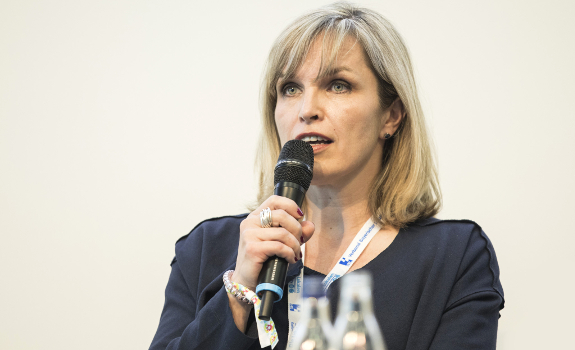
Sina Peschke thinks that good female presenters deserve a more prominent role (image: BLM)
Increase your female factor
He’s witnessed what can happen to people who are forcing themselves. “I’ve seen colleagues who were popular and famous for being the funniest people out there, who in their personal life were very sensitive and almost depressive artistic types, who had difficulties when people criticised them. On air, they were clowns and comedians, but they died in real life, as they were trying to be someone they were not. I said: when I do this job, then as me. When I’m not successful with it: bad luck.”
Sina Peschke has always resisted the stereotype setting of a male host with a female sidekick. “I’ve never wanted to be that girl laughing about the jokes of the guys. I would like to motivate all females to go beyond thinking that what they can do on air is doing the weather, or at best reading the traffic, and laugh a bit one the side.” She also feels like program directors could be brave and consider women for prominent roles within a morning show. “Men can read the weather as well; they’re pretty good at that, too.”
Personalise your show prep
Jürgen Kaul from Bayern 1 is asking the panel what they think of a current (German) trend of completely scripted morning shows, where hosts are mostly reading prewritten copy. “I doubt that a scripted break is bad by default, but a scripted show would have to be filled with actors instead of personalities”, Robert Kratky states. Viktor Worms believes we should make the result count. “When you write it out, and it sounds great, then write it out in advance — and when you ad lib it, without getting lost, then ad lib it.”
Kratky knows which arguments program directors like to use for introducing scripted morning shows. It can be anything from ‘too much talk’ to a feeling that team talks don’t work or cause clutter (like when presenters talk through another). He has nothing against a suggestion from his production team. Even if he will hardly ever use that copy, he says those three or four sentences allow him to get familiar with a story quickly. He’s against scripted shows, though, fearing that radio could then loose one its premium asset. “Authenticity is what radio can deliver better than any other medium.”
Header image: Thomas Giger

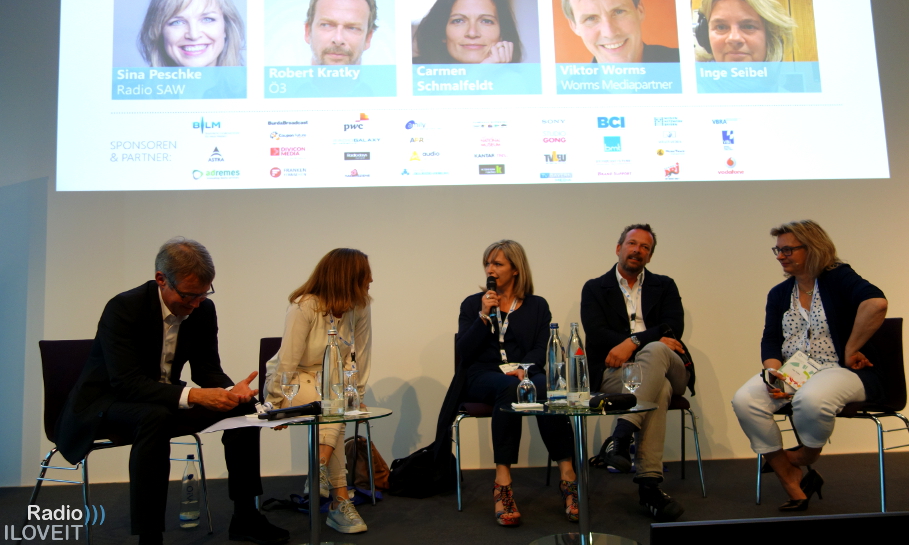




Add Your Comment